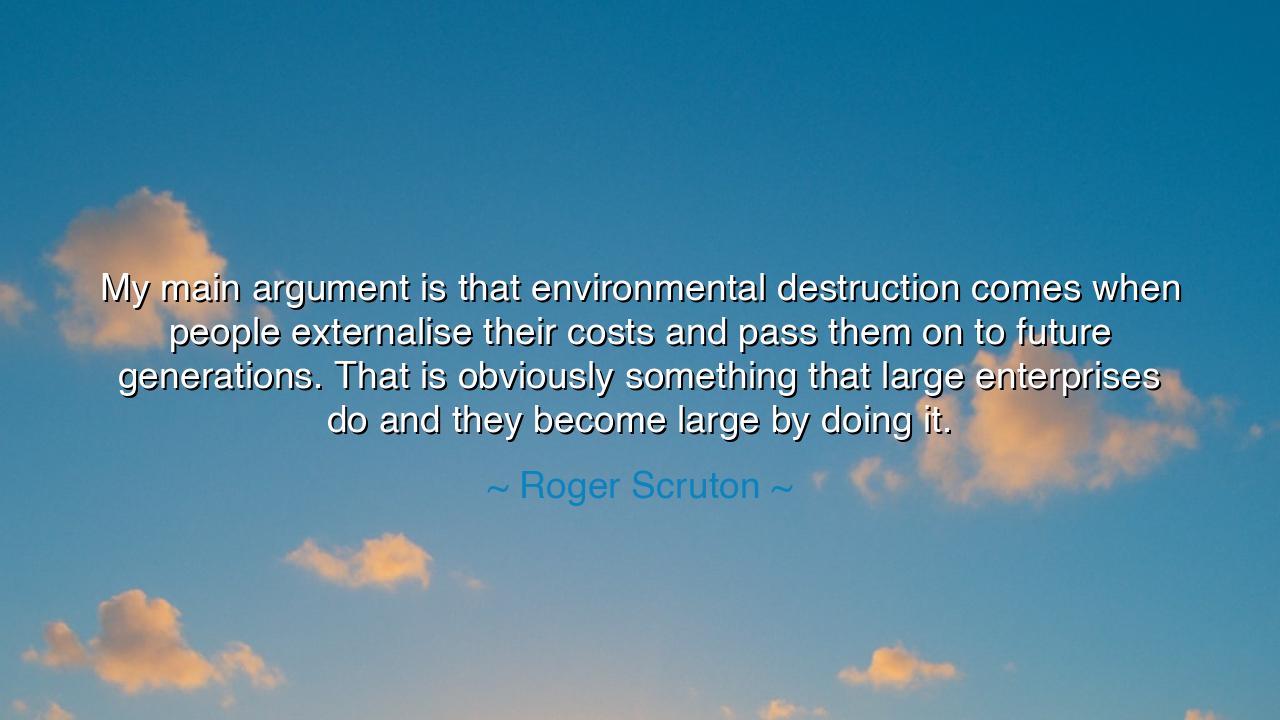
My main argument is that environmental destruction comes when
My main argument is that environmental destruction comes when people externalise their costs and pass them on to future generations. That is obviously something that large enterprises do and they become large by doing it.






Hear, O children of the earth and guardians of tomorrow, the words of Roger Scruton: “My main argument is that environmental destruction comes when people externalise their costs and pass them on to future generations. That is obviously something that large enterprises do and they become large by doing it.” These words pierce like an arrow, for they reveal the hidden wound beneath much of the world’s wealth and power. They show that environmental destruction is not an accident, nor merely the fruit of ignorance, but the deliberate act of pushing burdens away—onto the voiceless, the distant, and above all, the unborn.
The ancients knew the truth of burden-shifting. The strong often enriched themselves by laying their costs upon the weak, whether through taxes, forced labor, or conquest. What Scruton names in modern terms—externalising costs—is the same injustice that has echoed since empires first rose: to claim the harvest while leaving the toil, the ruin, and the ashes for others. The difference is that now, these costs are not only laid upon the poor of today, but upon the countless souls of tomorrow, who will inherit poisoned waters, a burning sky, and barren soil.
Consider the story of the Industrial Revolution. Factories rose in splendor, fortunes were made, and nations proclaimed progress. Yet the rivers ran black with coal and dye, the air thickened with smoke, and the laborers sickened in the very cities they built. The profits were counted in gold, but the true costs—disease, pollution, shortened lives—were not paid by those who grew rich, but by the people around them and the generations that followed. Here we see Scruton’s teaching: large enterprises become large precisely because they shift their costs, leaving scars upon the world they claim to build.
And look to the fate of the Aral Sea, once the fourth-largest lake in the world. In the twentieth century, vast irrigation schemes were built to feed the ambitions of agriculture. Cotton fields grew, empires profited, but the sea itself dried away, leaving behind salt, dust, and ruin. Millions lost their livelihoods, and future generations inherited a desert where once waves had rolled. The wealth of a few decades was purchased at the price of a wound that will endure for centuries. Thus do the mighty grow by sacrificing tomorrow for today.
The meaning of Scruton’s words is not merely to condemn but to awaken. For if enterprises grow by passing costs forward, then the true measure of responsibility is to reverse this—to bear one’s own burdens, to account honestly for the harm one creates, and to refuse to purchase wealth at the expense of descendants. This requires courage, because it demands restraint from profit and discipline of desire. Yet it is the only path by which humanity can walk in justice toward the generations yet unborn.
The lesson for future generations is this: be not deceived by the glitter of wealth or the size of corporations. Ask always: who pays the hidden price? Whose lungs breathe the smoke, whose rivers are poisoned, whose children will inherit the ruins? True greatness does not come by externalising costs, but by bearing them rightly, by repairing what is broken and ensuring that the earth is handed down in health, not sickness.
Practical action lies before us: demand that companies pay the true cost of their actions, through law, through activism, and through your own choices as consumers. Support systems that hold the powerful accountable, and live in ways that lessen the burden you pass on. Plant trees where others cut them, conserve where others waste, repair where others discard. For every act that shoulders today’s burden is a gift to tomorrow’s children.
So let it be remembered: environmental destruction is not destiny, but the result of choices made in selfishness. And so too is the future: it can be destruction if we persist in passing costs forward, or it can be renewal if we learn to carry them ourselves. Choose, therefore, to live with honesty and care, that those who come after may bless your memory, not curse your name.






AAdministratorAdministrator
Welcome, honored guests. Please leave a comment, we will respond soon